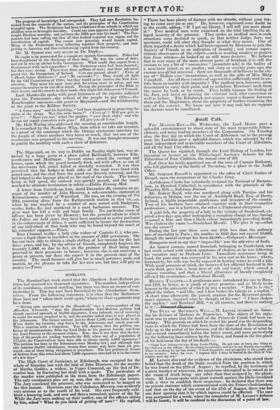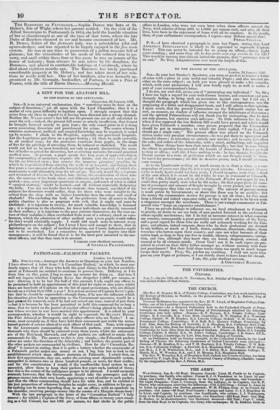ftiall Cam. • Tim MAsTEn-KEY.—On Wednesday, the Lord Mayor gave
a splendid entertainment to about sixty of his most respectable fellow citizens, and many leading members of the Corporation. On Tuesday also, the first day on which the Court of .Aldermen • sat in the present year, his Lordship gave a splendid dinner, which was attended by the most independent and respectable members of the Court of Aldermen, and all the high City officers.
The Queen has signified, through the Lord Bishop of London, her intention to bestow on the Whitechapel Society's Schools for the Education of Poor Children, the annual sum of 201.
Earl Grey has lately appointed one of the sons of Captain Bathurst, who fell gloriously at the battle of Navarino, to a place in the Audit Office.
Mr. Sergeant Russell is appointed to the office of Chief Justice of Bengal, upon the resignation of Sir Charles Grey.
Archdeacon Clarke has voluntarily resigned his Prebend of Bartons- ham, in Hereford Cathedral, in accordance with the principle of the Plurality Bill.—Salisbury Journal.
Mr. Robert Boyd, who was murdered along with Torrijos and his followers, at Malaga, was the son of Archibald Boyd, Esq. of Derry, Ireland, a highly respectable gentleman, and treasurer of the county. Two of his brothers have attained superior rank in their respective professions ; one is a barrister, the other a Protestant clergyman.
A gold fish, the property of a lady in the vicinity of Sunderland, ex- pired a few days ago, after undergoing a complete change of hue, having assumed a blue and then a black colour immediately preceding death. Was cholera the cause?.—Sunderland Herald. [We give it up—what was the cause ?] . During the last year there were one fifth less than the ordinary - rate of mortality in Paris ; the number in 1831 does not exceed 19,000, though the annual average has been 24,000.—Galignani's Messenger.
Bonaparte used to say that "impossible" was the adjective of fools.
An honest carman, named Snowball, belonging to Sunderland, was last week seized with violent symptoms of cholera, as he was following his vocation near to Durham Lane. Immediate assistance being at band, the poor man was conveyed in his own cart to his home; where, fortunately, his wife was busily engaged in heath]," water to scald a pig: With great presence of mind, she immersed her afflicted husband in the warm fluid, gave him a large dose of salt and water, which caused a copious vomiting, and then a liberal allowance of brandy completely effected his restoration.—Sunderland Herald. .
HIDDEN TALENTS.—A gentleman once introduced his son to Row- and Hill, by letter, as a youth of great promise, and as likely to do I honour to the university of which he was a member. - " But he is shy," 4 added the father, "amid idle, and I fear buries his talents in a napkin." A short time afterwards the parent, anxious for the Reverend gentle- man's opinion, inquired what he thought of his son? " I have shaken , the napkin," said Rowland Hill, "at all corners, and there is nothing in it. "--..-.01sweettete.
. . _
THE DUKE OF BOuRBON'S Lava.ux resumed on Satur- day his defence of Madame de Feucheres. The object of his argu- ment was to prove that the death of the Prince de Conde had been vo- luntary. The grounds on which he rested his proof was the desponding state in which the Prince had been from the time of the Revolution of July up to the period of his decease, and the disturbed state of mind he had evinced immediately before the latter event, and more particularly on the following lines written by the Prince, and found in the fire-place of his bed-room the day of his death :— " Saint Len belongs to yon, King Louis Philip. Do not take or burn any thing in , the elniteau or the village. Do no wrong to anybody, neither to my friends item'enemies- There is nothing fbr me but death. I wish happiness and prosperity to the people and to my country. Adieu for ever. I request that I may be buried in the ditch of Vin- • eennes, near my son."
Laraux also read the evidence of the physicians, who stated their belief that the death of the Duke resulted from the position in which he was found on the 27th of August ; he repelled, by the testimony of a great number of witnesses, the suspicions attempted to be raised as to the -.cause of death being any other than that assigned by the physi- cians. M. Lavaux spoke with great warmth against the libels circulated with a view to establish these suspicions : he declared that there was no private staircase which communicated with the Prince's bedchamber, and that on the day of the event of the 27th of August, there was but one door opening into it by which ingress could be effected. The case was postponed for a week, when the remainder of M. Lavaux's defence will be heard.; it will be confined to the discussion of a point of law. • THE BARONESS DE FELICHERES.—Sophia Dawes was bora at St. Helen's, Isle of Wight, where her parents resided. On the visit of the Allied Sovereigns to Portsmouth in 1814, she held the humble situation of bar or chambermaid at one of the inns of that town, where the late Duke of Bourbon chanced to see and became enamoured of her. Mr. R. Dawes, father of the fortunate lady, was a painstaking pilot and oyster-dredger, and was reported to be largely engaged in the free trade system. He was at one time in possession of a gallon measure full of guineas ; but the vicissitudes of his mode of life reduced him to po- verty, and until within these four or five years he was an inmate of the house of industry; from whence he was taken by his daughter, the Baroness, and placed in comfortable lodgings at Carisbrook, where be died about eighteen months ago. The Baroness has lately purchased considerable property at St. Helen's, and has taken most of her rela- tions to reside with her. One of her brothers, who was formerly ap- prenticed to Mr. Germain, bookseller, of Portsea, is now a Peer of .France, with the title of Baron Dawes.—Morning Herald.































 Previous page
Previous page